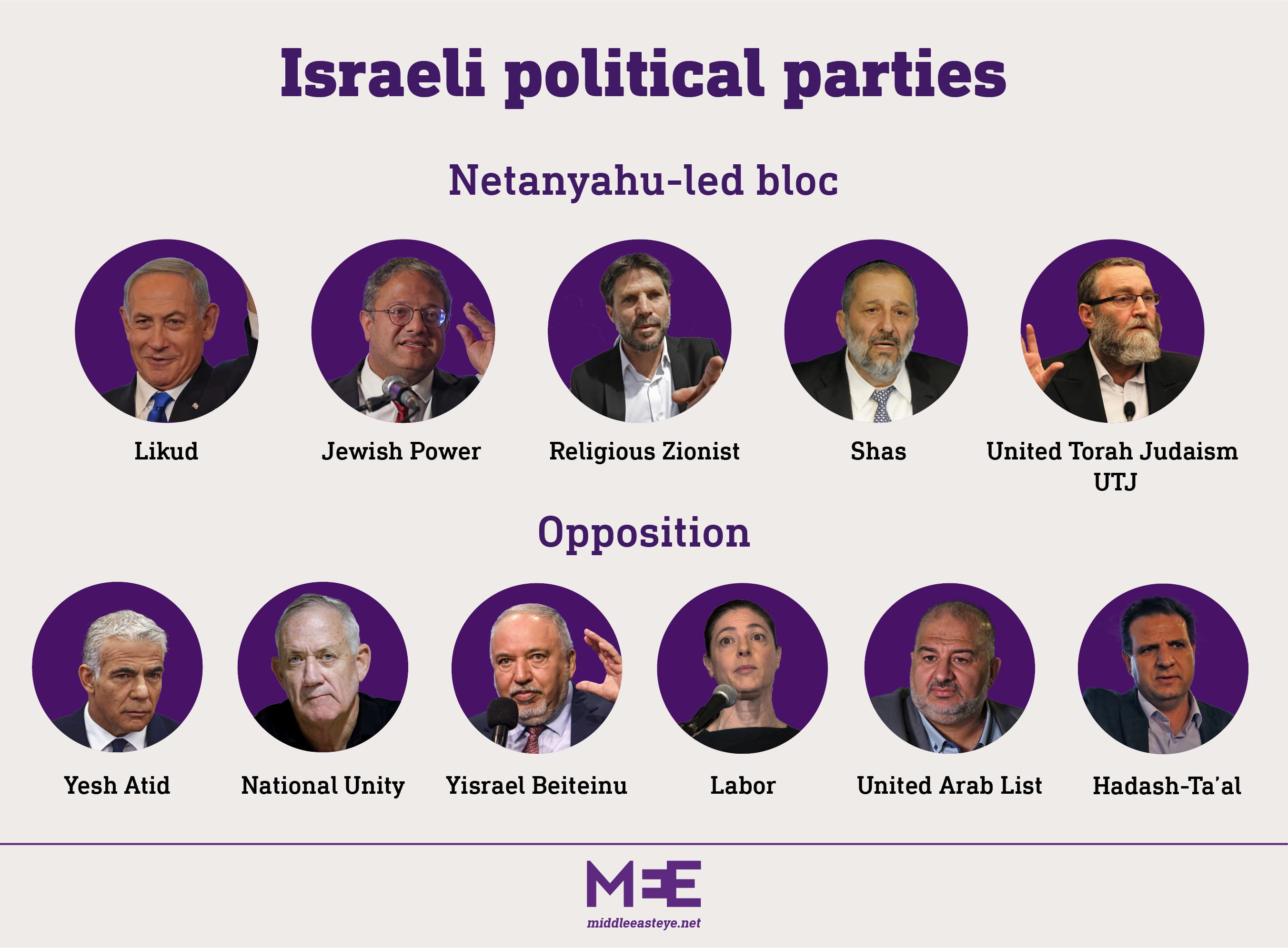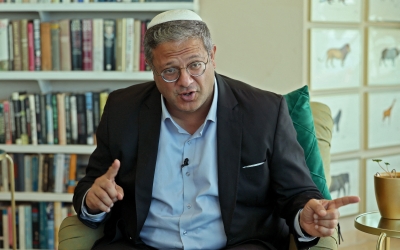Israel elections: Ben-Gvir the real winner in a new era defined by Jewish supremacy

The people of Israel, worn out by five rounds of elections in just over three years, wanted a clear-cut result from the 1 November election, whatever the outcome.
And they got it: a resounding win for the ultra-nationalist, Jewish supremacist right, driven by the rising political heavyweight Itamar Ben-Gvir.
A new Israel has been born out of this election, one where the murky definition of the state as "Jewish-democratic", often questioned if possible, has been categorically decided: Jewish – yes; democratic – hardly.
The outcome of the results, although paving the way for a dramatic return to power for former prime minister Benjamin Netanyahu, will have ramifications that go far beyond his personal victory.
The religious right-wing parties are the true winners, who together are set to eclipse Likud's once-unrivalled dominance of the right in Israel.
New MEE newsletter: Jerusalem Dispatch
Sign up to get the latest insights and analysis on Israel-Palestine, alongside Turkey Unpacked and other MEE newsletters
The three partners in Netanyahu's future coalition – the Ashkenazi ultra-Orthodox United Torah Judaism UTJ (set to gain eight seats), the Sephardi Orthodox Shas party (set to gain 11 seats), and the Religious Zionism alliance (set to gain 14 seats) – are projected to cobble together 33 seats between them, one more than Likud's 32 seats.
Among these parties, the seemingly contradictory essence of the "Jewish-democratic" state question never troubles them.
Their answer has always been "Jewish state" first, if not only.
Netanyahu's Likud, which has been accused of its own anti-democratic streaks, will be a minority within its own bloc of 65 out of the 120 seats in the parliament, or Knesset. The Zionist left is practically dead in this new day in Israel.
New territory for Netanyahu
Early on election day, caretaker Prime Minister Yair Lapid told the press: "These elections are a choice between the past and the future."
The past seems to have won and is set to define the future. One symbolic example: only eight or nine women, based on partial results, will be part of Netanyahu's coalition of 65 MPs.
There are no women in any of the religious Orthodox parties.
In a radio interview early on Wednesday, MP Orit Strook of Religious Zionism drew the outlines of the new government: Jewish state, governance, sovereignty.
All three leave out the Palestinian citizens of Israel, who make up 20 percent of the population.
Asked about the annexation of the occupied West Bank in the future, she evaded the answer. The two-state solution, whatever it's worth, is now officially dead and buried.
This is not what Netanyahu dreamt of. In all his former governments, he made a conscious effort to be the main force in the political right, ensuring that some centrist partners were included in his coalitions.
It served him well within Israel and even better abroad, especially with the US government, which under the administration of Joe Biden is now sending concerned messages.
This time, he is the "moderate" player in the most radical right coalition ever put together.
It is not the usual comfort zone of the man who is often ready to appropriate every success to himself. This was rather evident in his subdued address to Likud members after initial results showed him leading in exit polls.
"It's a good start, that's all I can say right now," Netanyahu said in his first reaction to the polls. "It depends on the real count."
He knows the truth, and he hears the voices. Ben-Gvir the far-right leader of the Otzma Yehudit (Jewish Power) party of the Religious Zionism alliance, is of course the real winner.
'Ben-Gvir's time'
The moment Ben-Gvir entered his party's headquarters late on Tuesday, the crowd was chanting "the prime minister is coming". The Jewish supremacist MP responded modestly: "Not yet."
The crowd then moved to chant the popular lyrics "death to terrorists", really meaning "death to Arabs". The words had been changed from "Arab" to "terrorists" by Ben-Gvir himself, in one of many attempts to tone down some of his explicit anti-Palestinian slurs.
Though carefully disguised throughout the campaign, once victory was secured, Ben-Gvir took off his moderate mask.
He openly exchanged warm embraces with infamous racists and homophobes that he had distanced himself from for weeks in the lead-up to the vote. Those included Dov Lior, one of the most radical rabbis of the settler movement, who on multiple occasions called for ethnic cleansing of Arab Muslims and expressed support for mass murders.
"It's okay to kill innocent civilians and destroy Gaza," he said in 2014, to quote one of his many inflammatory remarks.
But Ben-Gvir's modesty was in place. He is not yet prime minister, despite having the future prime minister almost totally relying on him.
The former attorney, who lives in an illegal Israeli settlement in the occupied West Bank, is arguably the main driver of the surprisingly high turnout in Tuesday's elections, the highest the country has witnessed since 2015.
Netanyahu sent him out to the periphery of Israel's political scene to bring to the ballots voters he himself failed to reach in the past, and those who traditionally abstain.
Ben-Gvir campaigning worked and brought first-time voters to the right's fold, but they mostly voted for the up-and-coming political star, not veteran Netanyahu
Ben-Gvir campaigning worked and brought first-time voters to the right's fold, but they mostly voted for the up-and-coming political star, not veteran Netanyahu.
That is why the longest-serving prime minister, whose record is set to be extended further, cannot appropriate the victory Ben-Gvir handed him.
"It's Ben-Gvir's time", was the Jewish Power party slogan, and for a change, it translated into reality.
Ben-Gvir has become the tail that wags the dog, and he is there to make the best out of it.
He wants to be the minister of public security and relax rules of engagement for the security forces, in the same vein that he is quick to pull his gun, especially on Palestinians when he "feels threatened".
He might get his wish. Bezalel Smotrich, the less prominent but no less dangerous leader of Religious Zionism, is after the defence ministry portfolio. He will likely be denied the role, but will still preserve the power to manipulate and extort Netanyahu, who owes both of them and needs them for his own success.
Failure of the left
The morning after polls closed, few politicians and analysts mentioned the alternative coalition option of Likud–National Unity party, led by the current minister of defence, Benny Gantz.
This is unlikely to happen as Gantz, like the rest of the anti-Netanyahu bloc, did poorly in the election, and is set to win 12 seats.
The same is true about Labor, which is projected to win four seats, and Meretz, who are so far expected not to pass the electoral threshold.
As such, there's no left in Israel other than Hadash-Ta'al, the two-party Palestinian list, projected to score five seats, but not really seen by the majority of Jewish Israelis as being part of the left.
One of the many reasons for the anti-Netanyahu bloc's failure is the participation of right-wingers – like Gantz, Avigdor Lieberman of the Yisrael Beytenu party, and Gideon Saar of the New Hope list – in the same camp as the left parties.
It was impossible to deliver a centre-left mandate while trapped in this setting of the outgoing governing coalition. Certainly so in the heterogeneous bloc made up of eight parties with little in common, other than to keep Netanyahu out of office.
Lapid as head of this bloc failed miserably to solidify them. He himself now has nothing to say other than "waiting for the last envelope to be opened and counted", as he said in advance of the results.
Worst is yet to come
Demography is a crucial factor in this changing Israel, and this is proved in the numbers. The Orthodox and settler populations have the highest birth rate in Israeli society. This is a fact.
The alliance that secular Netanyahu sealed with the Orthodox years ago was a politically smart move. No other sector is this loyal.
Another important factor in the results was the reaction to the violent events of May 2021, in which deadly violence between Palestinian and Jewish citizens rocked bi-national cities.
This was a traumatic experience for both sides that left a residue of mistrust and fear.
A campaign of fear led by the right flourished on this fertile ground; Ben-Gvir was the right person at the right time to make the best out of it.
Again, the left offered no alternative agenda and failed to address this sentiment. Just like in other countries now in a world drenched in fear, the radical and fascist right-wing thrives.
The immediate questions now revolve around what the future government's agenda will be about.
Judging by the first statements of Likud representatives, those allowed to comment, "reform" of the judicial system will be high on the agenda.
They say "reforms", but it will likely be a full-scale revolution to weaken the judiciary and empower politicians in the Knesset, as already outlined by Smotrich in the campaigning period.
This means the new government will likely work on legislation that could curtail the trial of Netanyahu's alleged corruption.
Likud MP Mickey Zohar was clear about what to expect next: "The main difference will be that this time, we will really govern."
A declaration that sounds more like a threat than a promise, a sign that the worst is yet to come.
This article is available in French on Middle East Eye edition.
Middle East Eye delivers independent and unrivalled coverage and analysis of the Middle East, North Africa and beyond. To learn more about republishing this content and the associated fees, please fill out this form. More about MEE can be found here.








